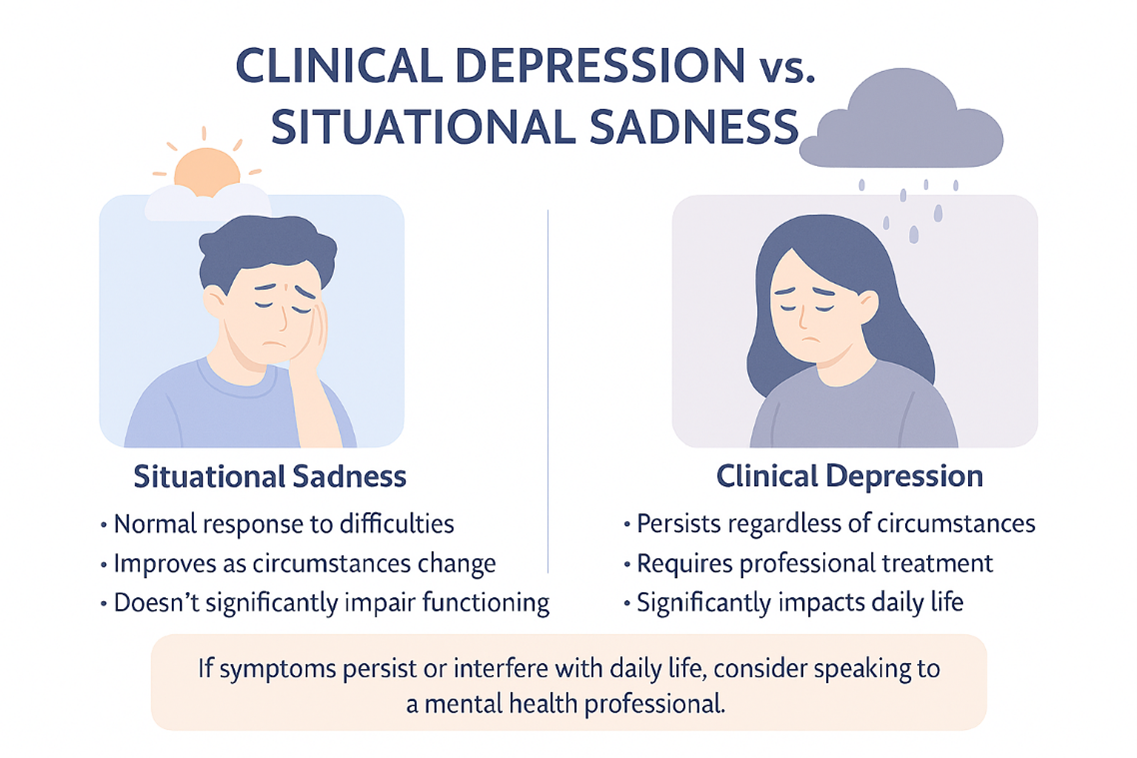Depression is a treatable medical condition affecting over 280 million people worldwide. It involves persistent sadness, loss of interest, and physical symptoms lasting weeks or longer. Effective treatments include therapy (particularly CBT), medication (SSRIs/SNRIs), and lifestyle changes. Recovery typically occurs within 6-12 weeks of starting treatment, with 60-80% of people experiencing significant improvement.
While sadness is a normal part of life, depression is different. It’s a complex mental health condition that deserves understanding, compassion, and professional support.
Depression is not a character flaw—it's a legitimate medical condition involving brain chemistry, genetics, and environmental factors.
|
Myth |
Reality |
|
"It's just sadness" |
Depression is a persistent medical condition affecting thoughts, physical health, and daily functioning |
|
"Think positively to cure it" |
Clinical depression requires professional treatment due to brain chemistry changes |
|
"Depression equals weakness" |
It's a medical disorder requiring the same care as physical illness |
|
"Antidepressants are crutches" |
Medication corrects chemical imbalances like insulin treats diabetes |
This guide offers a complete overview of depression—its causes, symptoms, treatments, and practical ways to heal.
Depression is a common but serious mood disorder that causes persistent feelings of sadness, emptiness, or hopelessness that interfere with daily life for at least two weeks.

Each type presents differently but shares the same need for compassionate care and proper treatment.
The Biopsychosocial Model: Depression rarely stems from a single cause—it usually results from a mix of biological, psychological, and environmental factors.
Biological Factors
Psychological and Environmental Factors
Depression can look different from person to person. Some signs are emotional, while others are physical or behavioral.
Emotional and Cognitive Symptoms
Physical Symptoms
Behavioral Signs
If you experience more than five symptoms for more than two weeks or worsen, it may be time to seek professional help.
Find a licensed professional through Myfu Space’s Therapist Directory.
Depression is typically diagnosed by a mental health professional using the DSM-5 criteria.
Common assessment tools include:
Because some medical conditions can mimic depression, it’s important to undergo a full medical evaluation before beginning treatment.
|
Common Mimickers |
Medical Tests |
|
Hypothyroidism |
TSH test |
|
Vitamin D deficiency |
25-OH vitamin D test |
|
B12 deficiency |
Serum B12 test |
|
Sleep apnea |
Sleep study |
|
Mwsication side effect |
Medication review |
You can find a psychologist who is suited to carry out these psychological assessments for you. Search for psychologists at Myfu Space’s Therapist Directory.
Depression is one of the most treatable mental health conditions. Many people experience significant improvement with the right combination of approaches.
Learn more about evidence-based psychotherapies.
Antidepressants such as SSRIs (Selective serotonin reuptake inhibitors) or SNRIs (Serotonin-norepinephrine reuptake inhibitors) can help regulate mood-related brain chemicals. These medications are most effective when used under the supervision of a psychiatrist.
Detailed information on antidepressants is available on the Mayo Clinic.
These small, daily choices can complement therapy and medication effectively.
Recovery often involves small, consistent steps rather than one big leap. Self-help strategies work best alongside professional treatment, not as replacement. Here are science-backed ways to support healing:
If someone you care about is struggling, your presence can make a real difference.
Do:
Don’t:
It’s also important for supporters to practice self-care and seek guidance when needed.
Depression recovery is ongoing. Here are proactive steps to stay well:
If you or someone you know is in crisis, please reach out immediately to your local emergency number or one of these helplines:
For non-crisis support, explore licensed therapists and mental health professionals listed in our wellness directory.
Depression is a serious but treatable condition. Understanding its signs, causes, and treatments can empower individuals to seek help early and recover fully. Whether through therapy, medication, or lifestyle change, the path to healing begins with one simple step—reaching out.
If you or someone you love is struggling, help is closer than you think.
Take Action Today: Browse Myfu Space’s Wellness Directory to connect with trusted professionals and resources that can guide you toward better mental health.

We're constantly exploring exciting new ways to support your wellbeing journey. Subscribe and you'll be first in line for not just our latest news, but also VIP access and special discounts on all our cool new products and services!
Spam-free zone, we promise! ✨